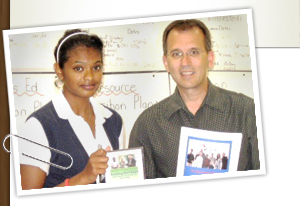Collaborating with Families
Engage positively. Tensions are not uncommon between educators and families. Families may have many expectations of the school and may be disappointed at what you or the school system does. As an educator, try not to shut down or become defensive. Families can be a source of important information and good ideas and also a great support to you in your work. Be honest about your limitations and don’t set up false expectations, but do be engaged and show that you are committed to their young person’s well being. Family participation is especially important in successful transition planning.
Fostering connections between families of your students is one of the most helpful things you can do in terms of enabling friendships to develop and deepen. This is especially true in the final school years of school, when otherwise those who have disabilities are most likely going to lose touch with their friends. You don’t need to be stymied by the confidentiality issue. Approach each of the families you would like to connect and ask if they would like to meet the other family and if they will give you permission to pass on their contact information. If both accept—and usually this is the case—they can contact each other to connect. You may also be able, once or twice a year, to create an afterschool or weekend social event so that families can come together with their young people and some of the teachers.


